Governance, Sustainability, and Ethics: Theories and Reporting
VerifiedAdded on 2022/09/28
|8
|1603
|23
Report
AI Summary
This report delves into the realm of corporate governance, sustainability, and ethics, examining the incentives for corporations to provide information to stakeholders. It explores three major theoretical approaches: stakeholder theory, corporate social responsibility (CSR), and the triple bottom line. The report analyzes each theory, highlighting the triple bottom line's focus on social, economic, and environmental impacts. It argues that stakeholder theory is the most persuasive, emphasizing the importance of considering all stakeholders' interests before business formulation. Furthermore, the report discusses the relationship between corporate social reporting and environmental responsibility, and it concludes that the triple bottom line leads to other separate bottom lines such as economic, social, and environmental, which are all parts of sustainability. The report references various scholarly articles to support its claims.
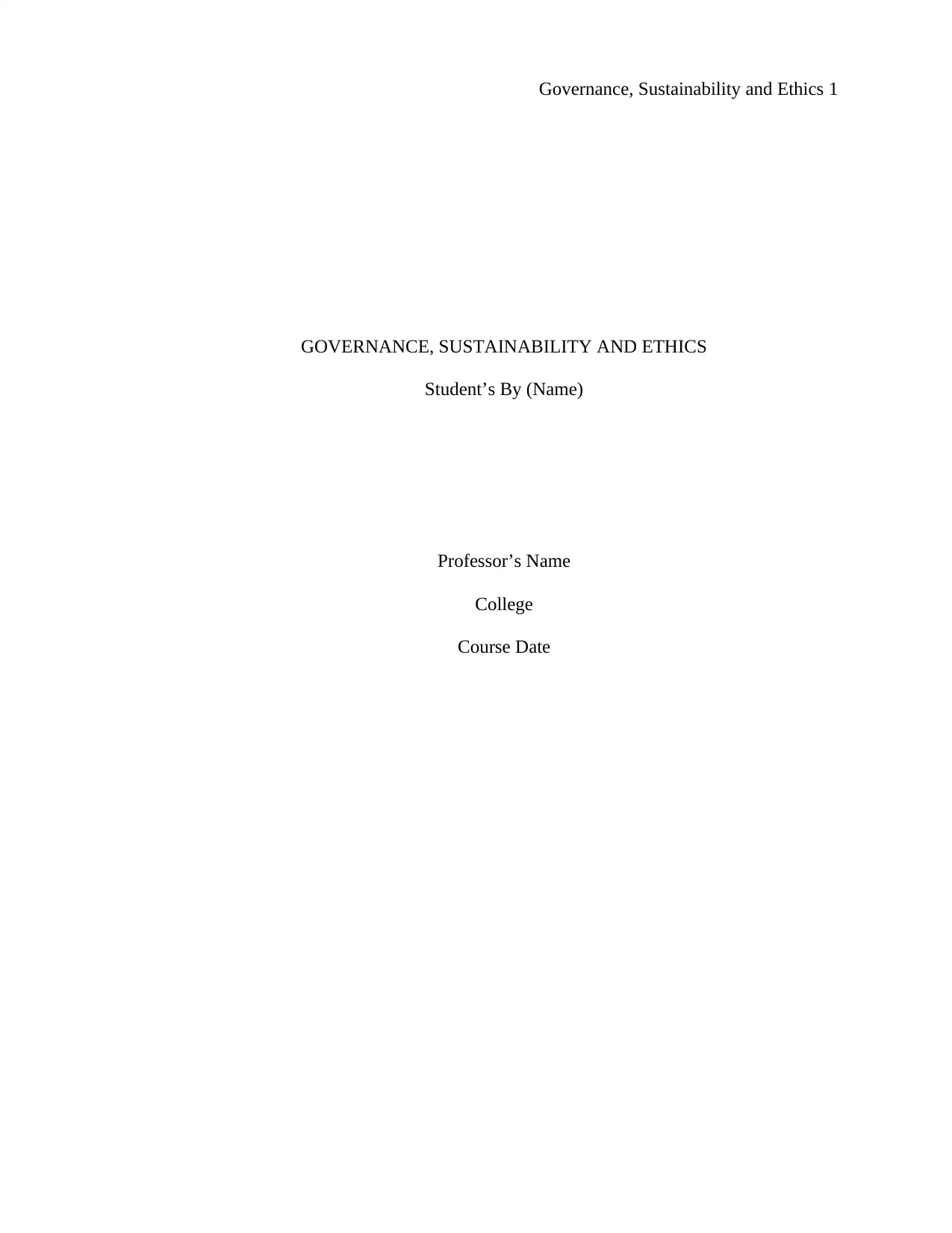
Governance, Sustainability and Ethics 1
GOVERNANCE, SUSTAINABILITY AND ETHICS
Student’s By (Name)
Professor’s Name
College
Course Date
GOVERNANCE, SUSTAINABILITY AND ETHICS
Student’s By (Name)
Professor’s Name
College
Course Date
Paraphrase This Document
Need a fresh take? Get an instant paraphrase of this document with our AI Paraphraser
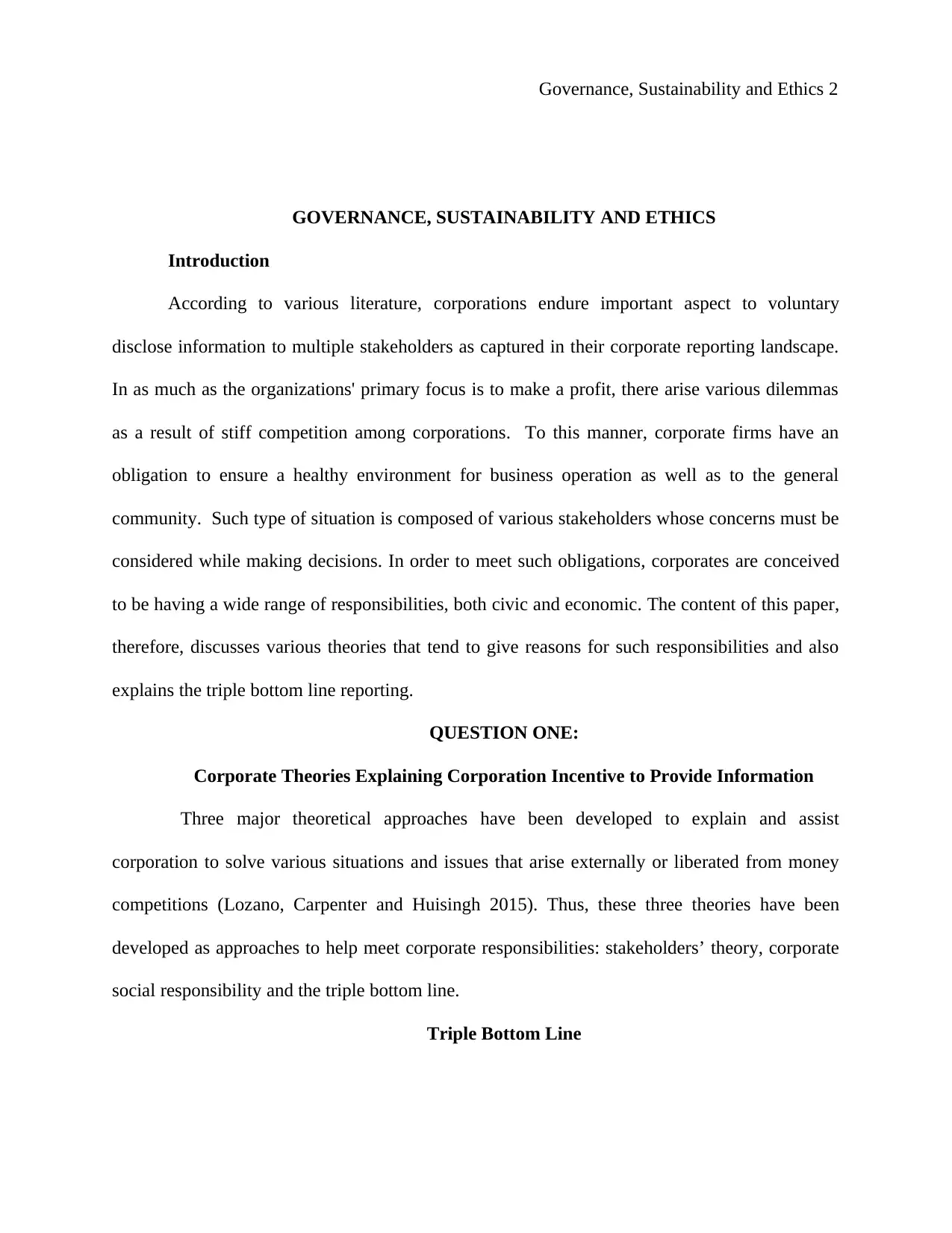
Governance, Sustainability and Ethics 2
GOVERNANCE, SUSTAINABILITY AND ETHICS
Introduction
According to various literature, corporations endure important aspect to voluntary
disclose information to multiple stakeholders as captured in their corporate reporting landscape.
In as much as the organizations' primary focus is to make a profit, there arise various dilemmas
as a result of stiff competition among corporations. To this manner, corporate firms have an
obligation to ensure a healthy environment for business operation as well as to the general
community. Such type of situation is composed of various stakeholders whose concerns must be
considered while making decisions. In order to meet such obligations, corporates are conceived
to be having a wide range of responsibilities, both civic and economic. The content of this paper,
therefore, discusses various theories that tend to give reasons for such responsibilities and also
explains the triple bottom line reporting.
QUESTION ONE:
Corporate Theories Explaining Corporation Incentive to Provide Information
Three major theoretical approaches have been developed to explain and assist
corporation to solve various situations and issues that arise externally or liberated from money
competitions (Lozano, Carpenter and Huisingh 2015). Thus, these three theories have been
developed as approaches to help meet corporate responsibilities: stakeholders’ theory, corporate
social responsibility and the triple bottom line.
Triple Bottom Line
GOVERNANCE, SUSTAINABILITY AND ETHICS
Introduction
According to various literature, corporations endure important aspect to voluntary
disclose information to multiple stakeholders as captured in their corporate reporting landscape.
In as much as the organizations' primary focus is to make a profit, there arise various dilemmas
as a result of stiff competition among corporations. To this manner, corporate firms have an
obligation to ensure a healthy environment for business operation as well as to the general
community. Such type of situation is composed of various stakeholders whose concerns must be
considered while making decisions. In order to meet such obligations, corporates are conceived
to be having a wide range of responsibilities, both civic and economic. The content of this paper,
therefore, discusses various theories that tend to give reasons for such responsibilities and also
explains the triple bottom line reporting.
QUESTION ONE:
Corporate Theories Explaining Corporation Incentive to Provide Information
Three major theoretical approaches have been developed to explain and assist
corporation to solve various situations and issues that arise externally or liberated from money
competitions (Lozano, Carpenter and Huisingh 2015). Thus, these three theories have been
developed as approaches to help meet corporate responsibilities: stakeholders’ theory, corporate
social responsibility and the triple bottom line.
Triple Bottom Line
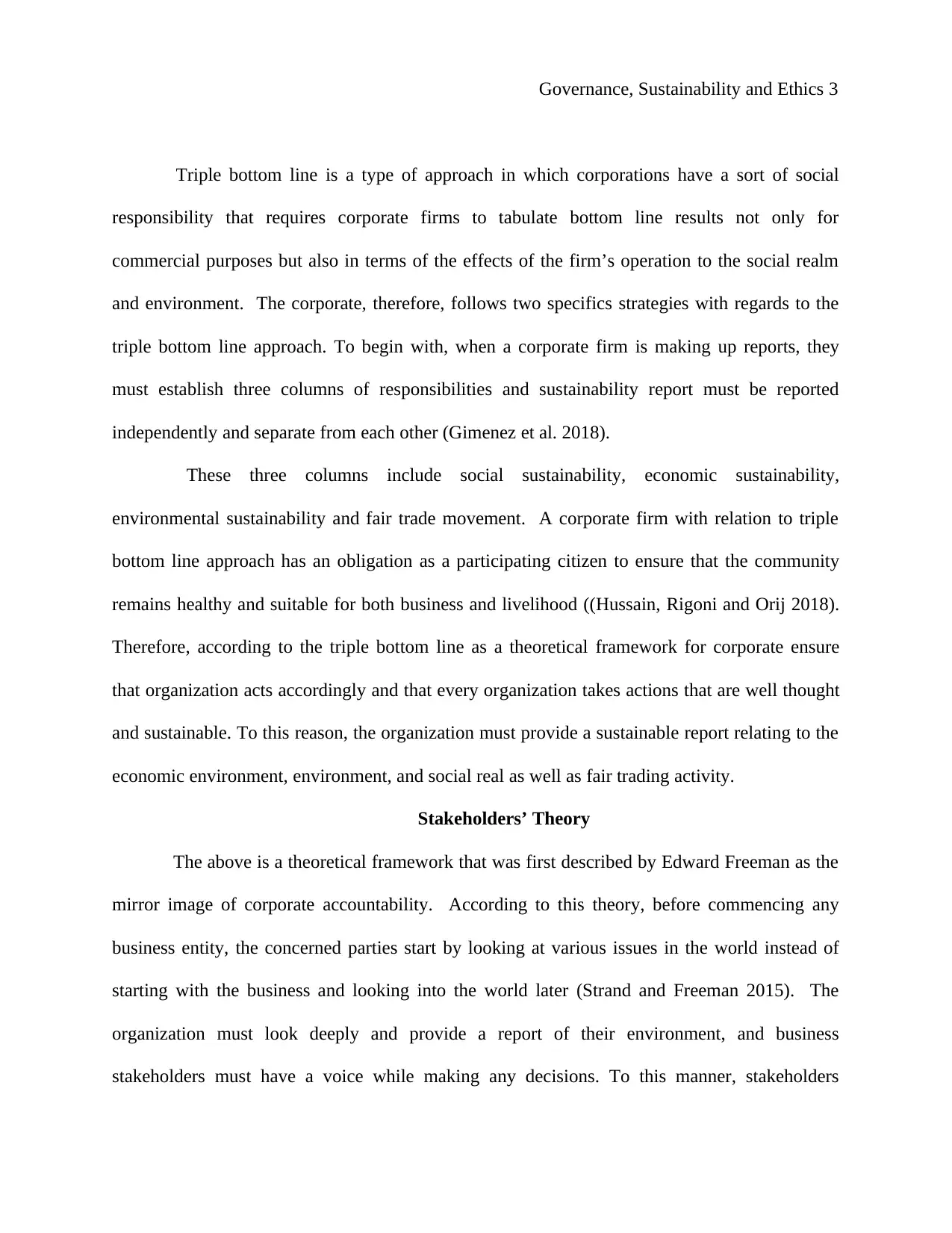
Governance, Sustainability and Ethics 3
Triple bottom line is a type of approach in which corporations have a sort of social
responsibility that requires corporate firms to tabulate bottom line results not only for
commercial purposes but also in terms of the effects of the firm’s operation to the social realm
and environment. The corporate, therefore, follows two specifics strategies with regards to the
triple bottom line approach. To begin with, when a corporate firm is making up reports, they
must establish three columns of responsibilities and sustainability report must be reported
independently and separate from each other (Gimenez et al. 2018).
These three columns include social sustainability, economic sustainability,
environmental sustainability and fair trade movement. A corporate firm with relation to triple
bottom line approach has an obligation as a participating citizen to ensure that the community
remains healthy and suitable for both business and livelihood ((Hussain, Rigoni and Orij 2018).
Therefore, according to the triple bottom line as a theoretical framework for corporate ensure
that organization acts accordingly and that every organization takes actions that are well thought
and sustainable. To this reason, the organization must provide a sustainable report relating to the
economic environment, environment, and social real as well as fair trading activity.
Stakeholders’ Theory
The above is a theoretical framework that was first described by Edward Freeman as the
mirror image of corporate accountability. According to this theory, before commencing any
business entity, the concerned parties start by looking at various issues in the world instead of
starting with the business and looking into the world later (Strand and Freeman 2015). The
organization must look deeply and provide a report of their environment, and business
stakeholders must have a voice while making any decisions. To this manner, stakeholders
Triple bottom line is a type of approach in which corporations have a sort of social
responsibility that requires corporate firms to tabulate bottom line results not only for
commercial purposes but also in terms of the effects of the firm’s operation to the social realm
and environment. The corporate, therefore, follows two specifics strategies with regards to the
triple bottom line approach. To begin with, when a corporate firm is making up reports, they
must establish three columns of responsibilities and sustainability report must be reported
independently and separate from each other (Gimenez et al. 2018).
These three columns include social sustainability, economic sustainability,
environmental sustainability and fair trade movement. A corporate firm with relation to triple
bottom line approach has an obligation as a participating citizen to ensure that the community
remains healthy and suitable for both business and livelihood ((Hussain, Rigoni and Orij 2018).
Therefore, according to the triple bottom line as a theoretical framework for corporate ensure
that organization acts accordingly and that every organization takes actions that are well thought
and sustainable. To this reason, the organization must provide a sustainable report relating to the
economic environment, environment, and social real as well as fair trading activity.
Stakeholders’ Theory
The above is a theoretical framework that was first described by Edward Freeman as the
mirror image of corporate accountability. According to this theory, before commencing any
business entity, the concerned parties start by looking at various issues in the world instead of
starting with the business and looking into the world later (Strand and Freeman 2015). The
organization must look deeply and provide a report of their environment, and business
stakeholders must have a voice while making any decisions. To this manner, stakeholders
⊘ This is a preview!⊘
Do you want full access?
Subscribe today to unlock all pages.

Trusted by 1+ million students worldwide
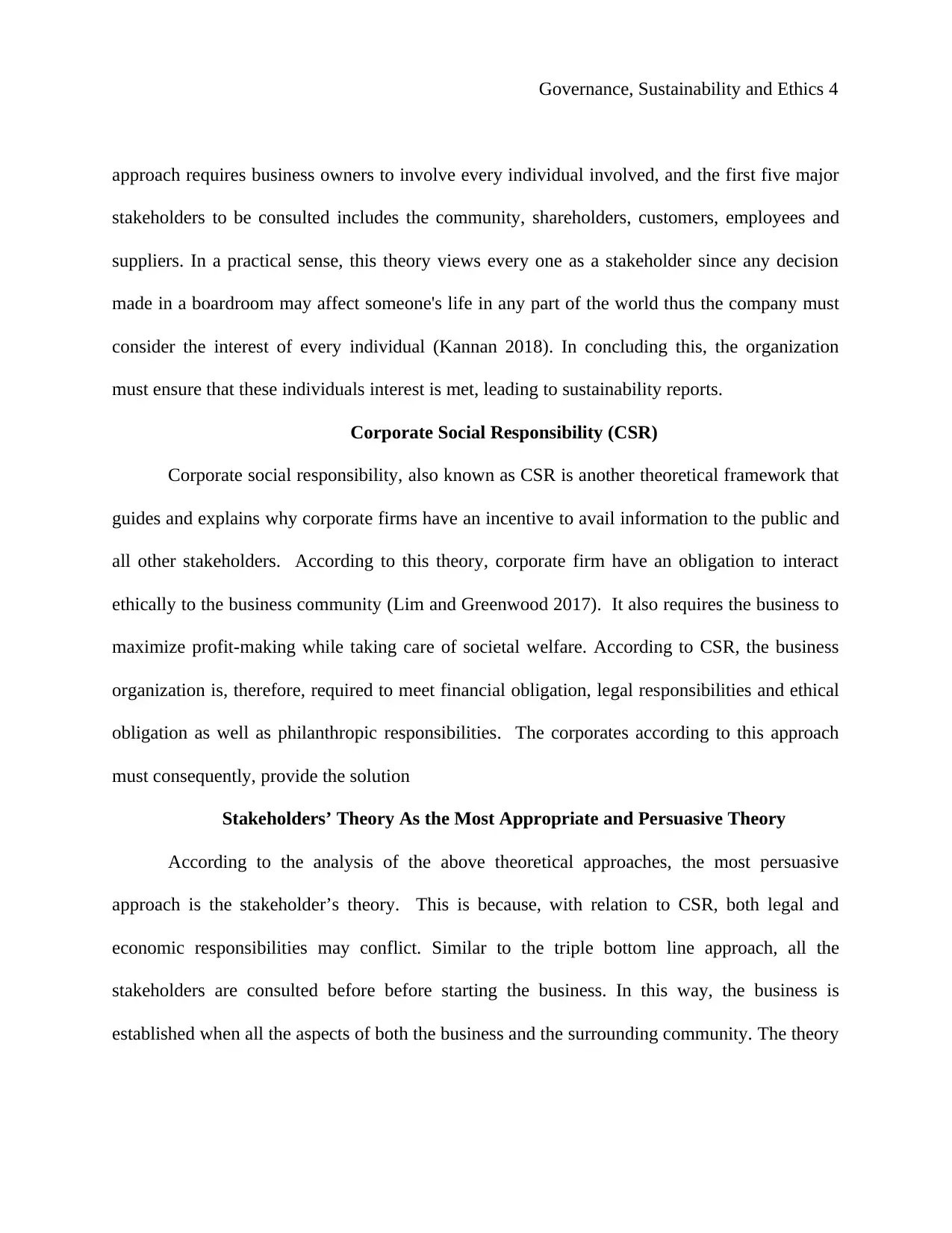
Governance, Sustainability and Ethics 4
approach requires business owners to involve every individual involved, and the first five major
stakeholders to be consulted includes the community, shareholders, customers, employees and
suppliers. In a practical sense, this theory views every one as a stakeholder since any decision
made in a boardroom may affect someone's life in any part of the world thus the company must
consider the interest of every individual (Kannan 2018). In concluding this, the organization
must ensure that these individuals interest is met, leading to sustainability reports.
Corporate Social Responsibility (CSR)
Corporate social responsibility, also known as CSR is another theoretical framework that
guides and explains why corporate firms have an incentive to avail information to the public and
all other stakeholders. According to this theory, corporate firm have an obligation to interact
ethically to the business community (Lim and Greenwood 2017). It also requires the business to
maximize profit-making while taking care of societal welfare. According to CSR, the business
organization is, therefore, required to meet financial obligation, legal responsibilities and ethical
obligation as well as philanthropic responsibilities. The corporates according to this approach
must consequently, provide the solution
Stakeholders’ Theory As the Most Appropriate and Persuasive Theory
According to the analysis of the above theoretical approaches, the most persuasive
approach is the stakeholder’s theory. This is because, with relation to CSR, both legal and
economic responsibilities may conflict. Similar to the triple bottom line approach, all the
stakeholders are consulted before before starting the business. In this way, the business is
established when all the aspects of both the business and the surrounding community. The theory
approach requires business owners to involve every individual involved, and the first five major
stakeholders to be consulted includes the community, shareholders, customers, employees and
suppliers. In a practical sense, this theory views every one as a stakeholder since any decision
made in a boardroom may affect someone's life in any part of the world thus the company must
consider the interest of every individual (Kannan 2018). In concluding this, the organization
must ensure that these individuals interest is met, leading to sustainability reports.
Corporate Social Responsibility (CSR)
Corporate social responsibility, also known as CSR is another theoretical framework that
guides and explains why corporate firms have an incentive to avail information to the public and
all other stakeholders. According to this theory, corporate firm have an obligation to interact
ethically to the business community (Lim and Greenwood 2017). It also requires the business to
maximize profit-making while taking care of societal welfare. According to CSR, the business
organization is, therefore, required to meet financial obligation, legal responsibilities and ethical
obligation as well as philanthropic responsibilities. The corporates according to this approach
must consequently, provide the solution
Stakeholders’ Theory As the Most Appropriate and Persuasive Theory
According to the analysis of the above theoretical approaches, the most persuasive
approach is the stakeholder’s theory. This is because, with relation to CSR, both legal and
economic responsibilities may conflict. Similar to the triple bottom line approach, all the
stakeholders are consulted before before starting the business. In this way, the business is
established when all the aspects of both the business and the surrounding community. The theory
Paraphrase This Document
Need a fresh take? Get an instant paraphrase of this document with our AI Paraphraser
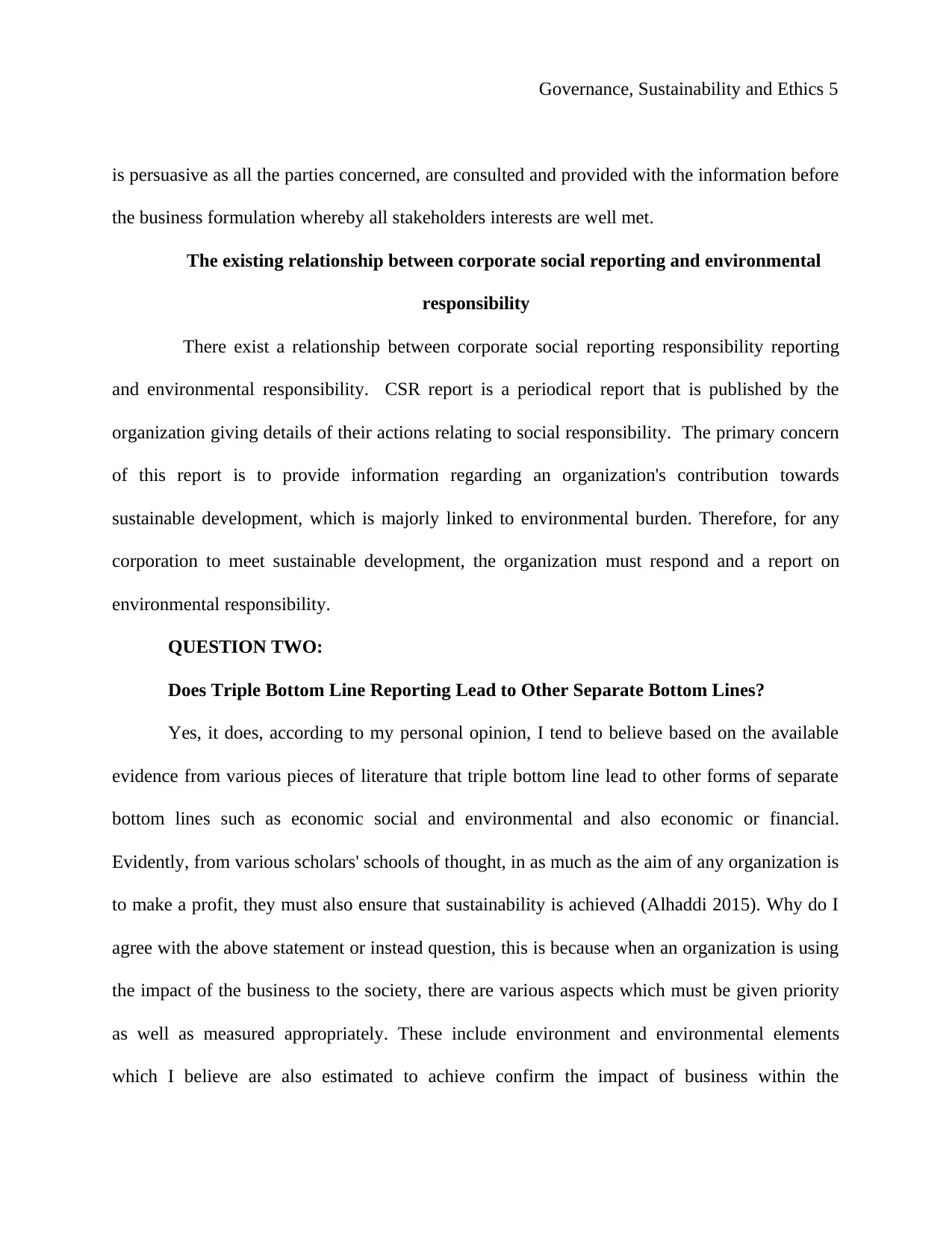
Governance, Sustainability and Ethics 5
is persuasive as all the parties concerned, are consulted and provided with the information before
the business formulation whereby all stakeholders interests are well met.
The existing relationship between corporate social reporting and environmental
responsibility
There exist a relationship between corporate social reporting responsibility reporting
and environmental responsibility. CSR report is a periodical report that is published by the
organization giving details of their actions relating to social responsibility. The primary concern
of this report is to provide information regarding an organization's contribution towards
sustainable development, which is majorly linked to environmental burden. Therefore, for any
corporation to meet sustainable development, the organization must respond and a report on
environmental responsibility.
QUESTION TWO:
Does Triple Bottom Line Reporting Lead to Other Separate Bottom Lines?
Yes, it does, according to my personal opinion, I tend to believe based on the available
evidence from various pieces of literature that triple bottom line lead to other forms of separate
bottom lines such as economic social and environmental and also economic or financial.
Evidently, from various scholars' schools of thought, in as much as the aim of any organization is
to make a profit, they must also ensure that sustainability is achieved (Alhaddi 2015). Why do I
agree with the above statement or instead question, this is because when an organization is using
the impact of the business to the society, there are various aspects which must be given priority
as well as measured appropriately. These include environment and environmental elements
which I believe are also estimated to achieve confirm the impact of business within the
is persuasive as all the parties concerned, are consulted and provided with the information before
the business formulation whereby all stakeholders interests are well met.
The existing relationship between corporate social reporting and environmental
responsibility
There exist a relationship between corporate social reporting responsibility reporting
and environmental responsibility. CSR report is a periodical report that is published by the
organization giving details of their actions relating to social responsibility. The primary concern
of this report is to provide information regarding an organization's contribution towards
sustainable development, which is majorly linked to environmental burden. Therefore, for any
corporation to meet sustainable development, the organization must respond and a report on
environmental responsibility.
QUESTION TWO:
Does Triple Bottom Line Reporting Lead to Other Separate Bottom Lines?
Yes, it does, according to my personal opinion, I tend to believe based on the available
evidence from various pieces of literature that triple bottom line lead to other forms of separate
bottom lines such as economic social and environmental and also economic or financial.
Evidently, from various scholars' schools of thought, in as much as the aim of any organization is
to make a profit, they must also ensure that sustainability is achieved (Alhaddi 2015). Why do I
agree with the above statement or instead question, this is because when an organization is using
the impact of the business to the society, there are various aspects which must be given priority
as well as measured appropriately. These include environment and environmental elements
which I believe are also estimated to achieve confirm the impact of business within the
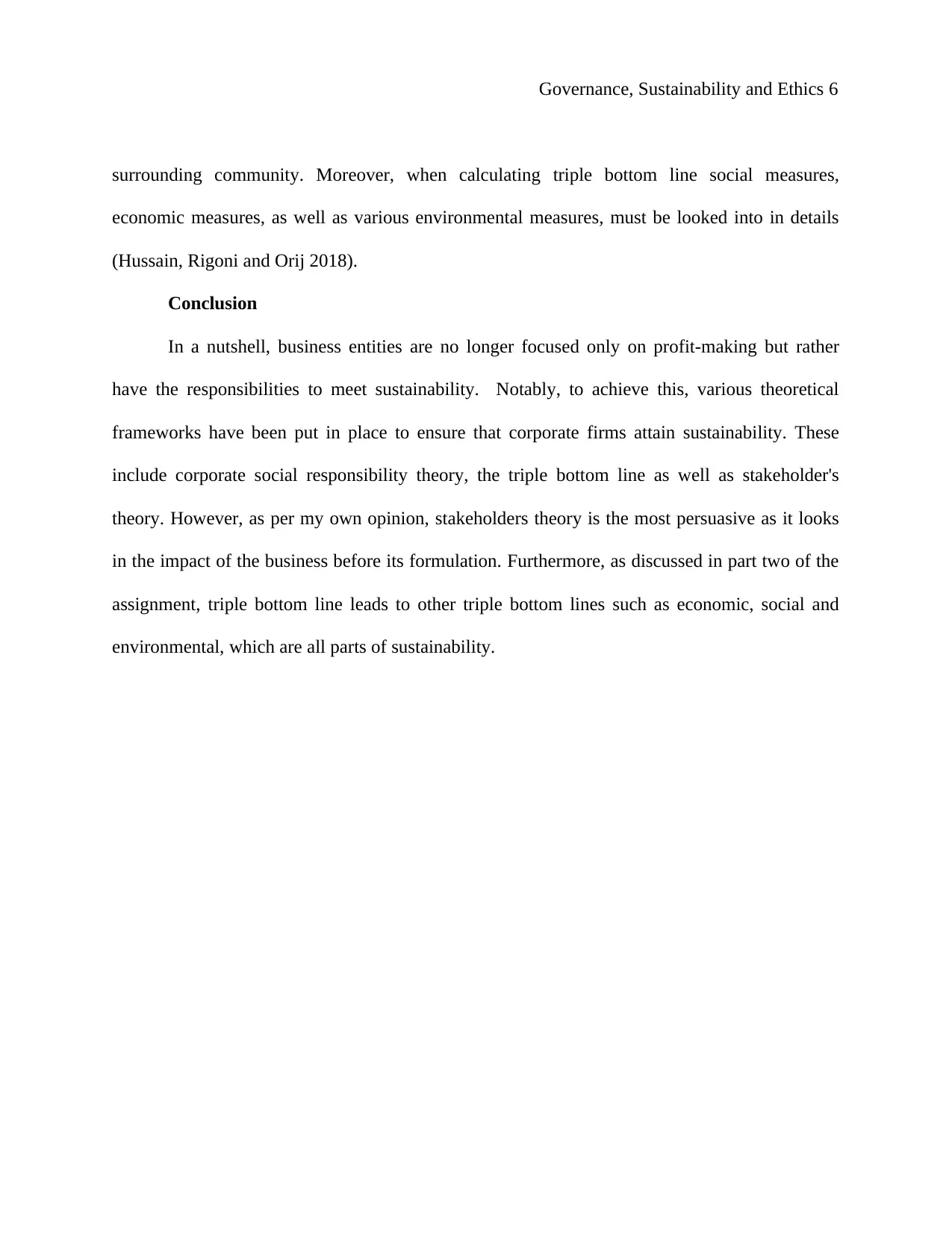
Governance, Sustainability and Ethics 6
surrounding community. Moreover, when calculating triple bottom line social measures,
economic measures, as well as various environmental measures, must be looked into in details
(Hussain, Rigoni and Orij 2018).
Conclusion
In a nutshell, business entities are no longer focused only on profit-making but rather
have the responsibilities to meet sustainability. Notably, to achieve this, various theoretical
frameworks have been put in place to ensure that corporate firms attain sustainability. These
include corporate social responsibility theory, the triple bottom line as well as stakeholder's
theory. However, as per my own opinion, stakeholders theory is the most persuasive as it looks
in the impact of the business before its formulation. Furthermore, as discussed in part two of the
assignment, triple bottom line leads to other triple bottom lines such as economic, social and
environmental, which are all parts of sustainability.
surrounding community. Moreover, when calculating triple bottom line social measures,
economic measures, as well as various environmental measures, must be looked into in details
(Hussain, Rigoni and Orij 2018).
Conclusion
In a nutshell, business entities are no longer focused only on profit-making but rather
have the responsibilities to meet sustainability. Notably, to achieve this, various theoretical
frameworks have been put in place to ensure that corporate firms attain sustainability. These
include corporate social responsibility theory, the triple bottom line as well as stakeholder's
theory. However, as per my own opinion, stakeholders theory is the most persuasive as it looks
in the impact of the business before its formulation. Furthermore, as discussed in part two of the
assignment, triple bottom line leads to other triple bottom lines such as economic, social and
environmental, which are all parts of sustainability.
⊘ This is a preview!⊘
Do you want full access?
Subscribe today to unlock all pages.

Trusted by 1+ million students worldwide
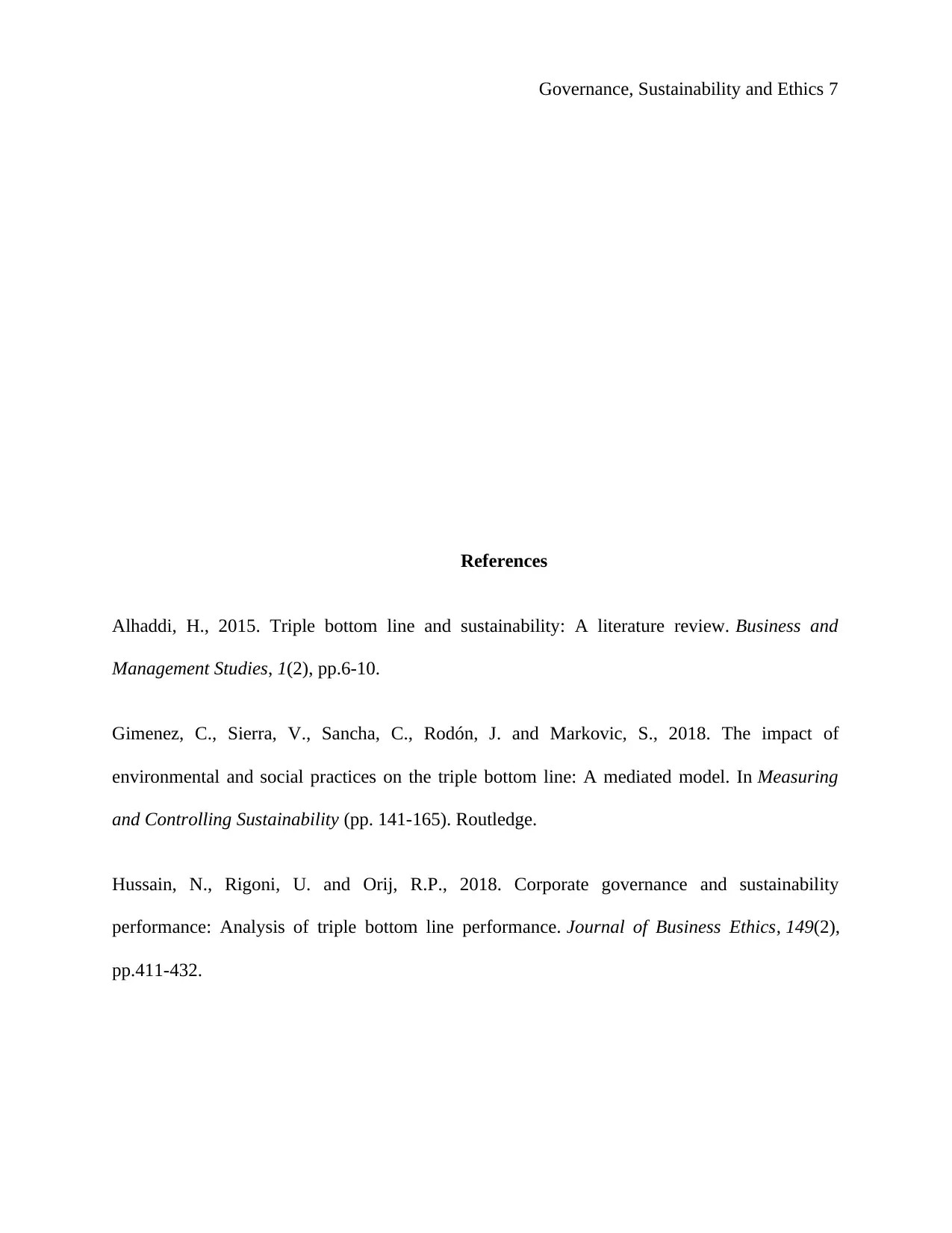
Governance, Sustainability and Ethics 7
References
Alhaddi, H., 2015. Triple bottom line and sustainability: A literature review. Business and
Management Studies, 1(2), pp.6-10.
Gimenez, C., Sierra, V., Sancha, C., Rodón, J. and Markovic, S., 2018. The impact of
environmental and social practices on the triple bottom line: A mediated model. In Measuring
and Controlling Sustainability (pp. 141-165). Routledge.
Hussain, N., Rigoni, U. and Orij, R.P., 2018. Corporate governance and sustainability
performance: Analysis of triple bottom line performance. Journal of Business Ethics, 149(2),
pp.411-432.
References
Alhaddi, H., 2015. Triple bottom line and sustainability: A literature review. Business and
Management Studies, 1(2), pp.6-10.
Gimenez, C., Sierra, V., Sancha, C., Rodón, J. and Markovic, S., 2018. The impact of
environmental and social practices on the triple bottom line: A mediated model. In Measuring
and Controlling Sustainability (pp. 141-165). Routledge.
Hussain, N., Rigoni, U. and Orij, R.P., 2018. Corporate governance and sustainability
performance: Analysis of triple bottom line performance. Journal of Business Ethics, 149(2),
pp.411-432.
Paraphrase This Document
Need a fresh take? Get an instant paraphrase of this document with our AI Paraphraser
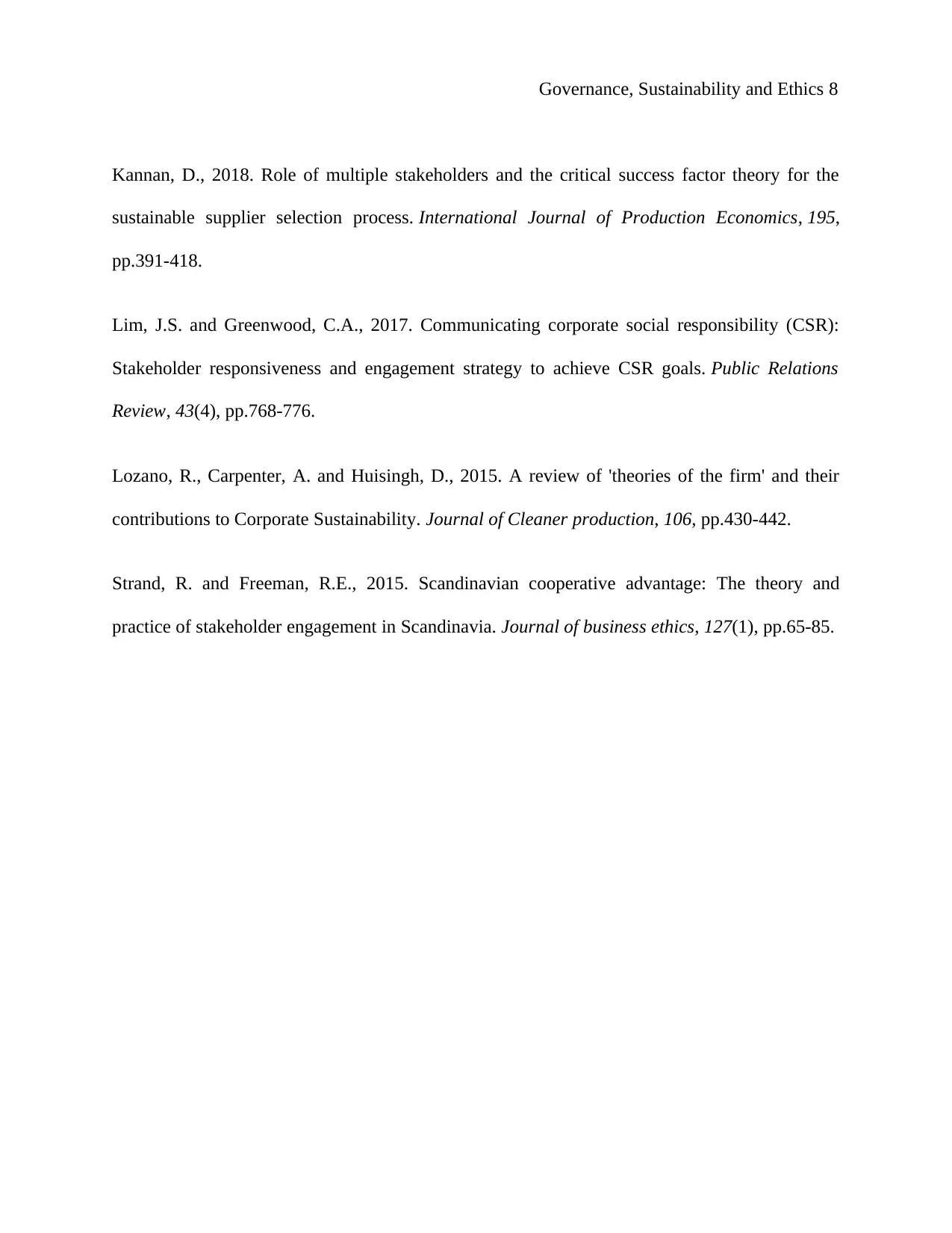
Governance, Sustainability and Ethics 8
Kannan, D., 2018. Role of multiple stakeholders and the critical success factor theory for the
sustainable supplier selection process. International Journal of Production Economics, 195,
pp.391-418.
Lim, J.S. and Greenwood, C.A., 2017. Communicating corporate social responsibility (CSR):
Stakeholder responsiveness and engagement strategy to achieve CSR goals. Public Relations
Review, 43(4), pp.768-776.
Lozano, R., Carpenter, A. and Huisingh, D., 2015. A review of 'theories of the firm' and their
contributions to Corporate Sustainability. Journal of Cleaner production, 106, pp.430-442.
Strand, R. and Freeman, R.E., 2015. Scandinavian cooperative advantage: The theory and
practice of stakeholder engagement in Scandinavia. Journal of business ethics, 127(1), pp.65-85.
Kannan, D., 2018. Role of multiple stakeholders and the critical success factor theory for the
sustainable supplier selection process. International Journal of Production Economics, 195,
pp.391-418.
Lim, J.S. and Greenwood, C.A., 2017. Communicating corporate social responsibility (CSR):
Stakeholder responsiveness and engagement strategy to achieve CSR goals. Public Relations
Review, 43(4), pp.768-776.
Lozano, R., Carpenter, A. and Huisingh, D., 2015. A review of 'theories of the firm' and their
contributions to Corporate Sustainability. Journal of Cleaner production, 106, pp.430-442.
Strand, R. and Freeman, R.E., 2015. Scandinavian cooperative advantage: The theory and
practice of stakeholder engagement in Scandinavia. Journal of business ethics, 127(1), pp.65-85.
1 out of 8
Related Documents
Your All-in-One AI-Powered Toolkit for Academic Success.
+13062052269
info@desklib.com
Available 24*7 on WhatsApp / Email
![[object Object]](/_next/static/media/star-bottom.7253800d.svg)
Unlock your academic potential
Copyright © 2020–2026 A2Z Services. All Rights Reserved. Developed and managed by ZUCOL.




